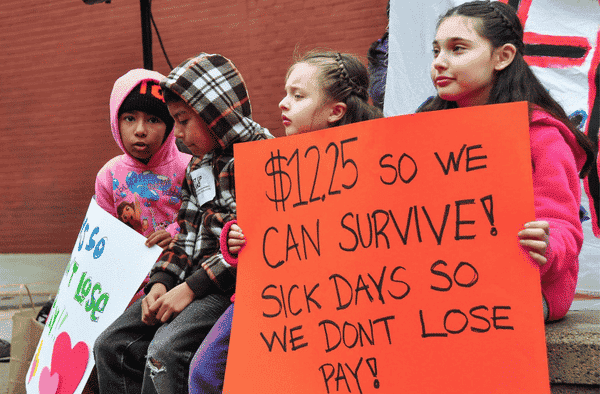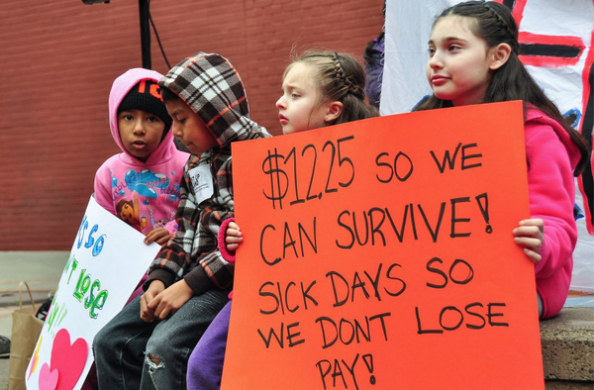Why the Momentum for Paid Sick Days?

By Ellen Bravo
As reporters took note of the clean sweep for paid sick days ballot initiatives in an otherwise lopsided electoral night, they all asked the same question: why now? What’s driving the momentum?
The answer is threefold:
- The need: as low-wage jobs proliferate and wages continue to stagnate, workers can’t afford to lose pay or a job for being a good parent or following doctor’s orders. Paid sick days is a jobs issue and an issue of family economic security.
- The evidence: years of wins mean we have a number of places where paid sick days has been in place long enough to be studied. The findings have shredded the predictions of doom by the opponents. The sky didn’t fall. Business didn’t flee. Job growth didn’t suffer. In fact, more and more business partners have become leaders in our coalitions because they know paid sick days is the smart as well as the right thing to do. It keeps people on their jobs. And it keeps money in people’s pockets. “Your workers are my customers,” is how small business owner Freddie Castiblanco of Elmhurst, NY puts it to other employers. “When they lose pay or a job because they don’t have paid sick days, they don’t come to my jazz club.” And when workers are able to earn paid sick days, that pay translates into spending that boosts the local economy.
- The organizing: initiatives don’t just appear on the ballot. They happen because of enormous work by a broad and diverse coalition of organizations deeply rooted in their communities. These groups engage voters in every stage – collecting signatures, educating neighbors, getting out the vote. And those efforts net more than votes. They build a growing progressive infrastructure.
-

- Paid sick days is a jobs issue and an issue of family economic security.
I live in Milwaukee, where we built such a campaign in 2008. I can still feel the sun on our cheeks as we canvassed neighborhoods and shopping centers that summer to collect nearly twice the number of signatures we needed to get paid sick days on the ballot. I remember the manager at a local McDonald’s who shooed us out of the restaurant – but met us on the sidewalk and asked to sign the petition himself. “Company policy forced me to fire someone who was out sick,” he said. “I want this to pass.”
And I remember the young man leaving a local restaurant who looked at the petition and was about to walk away. “I already have paid sick days,” he told me. “Good,” I said. “How about the person who just served your lunch?” He took the clipboard and signed his name.
We won that ballot initiative with nearly 70% of the vote. Later right-wing legislators in Wisconsin, backed by ALEC and corporate lobbyists, stole our win. They shoved through a law that prohibits municipalities from exercising local control on the issue of paid sick days. These opponents have expanded their efforts to other states. But they haven’t been able to stop our movement.
The ballot initiatives that just passed in Massachusetts; Oakland, CA; and Trenton and Montclair, NJ, will bring access to paid sick days to nearly a million more workers. These initiatives come on the heels of the biggest string of legislative wins on paid sick days to date, with more on the horizon. In 2014 we’ve already nearly tripled the number of locations where workers will be able to earn paid sick days, and more than tripled the number of workers included in these policies – to a total of more than 9.5 million. Many more people who already earn the time can now use it to care for a sick family member or deal with the aftermath of domestic or sexual violence. And millions more can take a sick day without getting disciplinary points for doing so.
This is what democracy looks like. People didn’t just vote for paid sick days – they demanded them. This demand will continue to grow as more and more people come to see that change is possible when we act together.